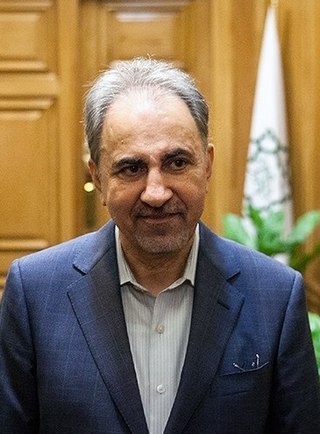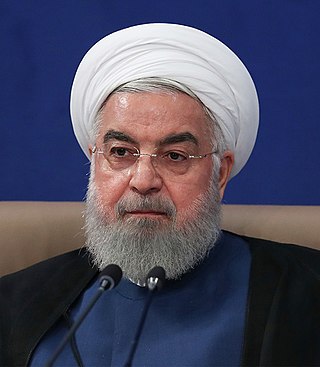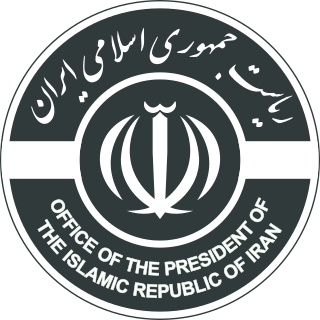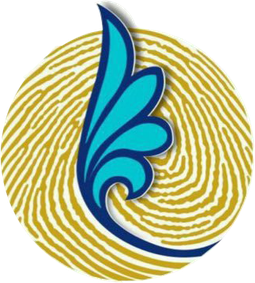| Coalition | Party | Picture | Name | Last political post | Level |
|---|
| Announced | Registered* | Withdraw | Qualified | Votes |
|---|
| Principlists | Progression Alliance
(2+1) |  | Mohammad-Bagher Ghalibaf
(born 1961) | Mayor of Tehran
(since 2005) | Yes | Yes | No | Yes | 6,077,292 |
 | Ali Akbar Velayati
(born 1945) | Minister of Foreign Affairs
(1981–1997) | Yes | Yes | No | Yes | 2,268,753 |
 | Gholam-Ali Haddad-Adel
(born 1945) | Chairman of the Parliament
(2004–2008) | Yes | Yes | Yes | Yes | — |
Abadgaran
(Cabinet Alliance) |  | Esfandiar Rahim Mashaei
(born 1960) | Chief of Staff of the President
(since 2009) | Yes | Yes | — | No | — |
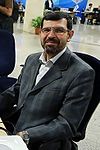 | Sadeq Vaeez Zadeh
(born 1964) | Head of National Elites Foundation
(2005–2009) | Yes | Yes | Yes | — | — |
 | Mohammad Reza Rahimi
(born 1949) | First Vice President
(since 2009) | Yes | Yes | Yes | — | — |
 | Ali Akbar Javanfekr
(born 1959) | Managing-Director of IRNA
(since 2010) | Yes | Yes | Yes | — | — |
 | Sadeq Khalilian
(born 1959) | Minister of Agricultural
(since 2009) | Yes | Yes | Yes | — | — |
 | Ali Nikzad
(born 1954) | Minister of Housing
(since 2011) | Yes | No | — | — | — |
 | Mehdi Chamran
(born 1941) | Chairman of City Council of Tehran
(since 2003) | Yes | No | — | — | — |
 | Nasrin Soltankhah
(born 1963) | Head of National Elites Foundation
(since 2009) | No | No | — | — | — |
 | Gholam-Hossein Elham
(born 1959) | Minister of Justice
(2006–2009) | No | No | — | — | — |
 | Hamid Baqai
(born 1969) | Head of Presidential Center
(since 2011) | No | No | — | — | — |
|
Front of Islamic Revolution Stability
(Paydari) |  | Saeed Jalili
(born 1965) | Secretary of Supreme National Security Council
(since 2007) | Yes | Yes | No | Yes | 4,168,946 |
 | Kamran Bagheri Lankarani
(born 1965) | Minister of Health
(2005–2009) | Yes | Yes | Yes | — | — |
 | Parviz Fattah
(born 1961) | Minister of Energy
(2005–2009) | Yes | No | — | — | — |
Conservatives Majority Alliance
(Aksariat) |  | Manouchehr Mottaki**
(born 1953) | Minister of Foreign Affairs
(2005–2010) | Yes | Yes | — | No | — |
 | Hassan Aboutorabi Fard
(born 1953) | Deputy Speaker of the Parliament
(2010–2011) | Yes | Yes | Yes | — | — |
 | Mohammad Reza Bahonar
(born 1951) | Deputy Speaker of the Parliament
(since 2004) | Yes | No | — | — | — |
 | Yahya Ale Eshaq
(born 1949) | Minister of Commerce
(1993–1997) | Yes | No | — | — | — |
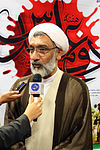 | Mostafa Pourmohammadi
(born 1959) | Minister of Interior
(2005–2008) | Yes | No | — | — | — |
United Front of Conservatives
(Motahedan) |  | Alireza Zakani
(born 1965) | Member of the Parliament
(since 2004) | Yes | Yes | — | No | — |
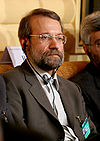 | Ali Larijani
(born 1958) | Chairman of the Parliament
(since 2008) | No | No | — | — | — |
| Resistance Front of Islamic Iran |  | Mohsen Rezaee
(born 1954) | Secretary of the Expediency Discernment Council
(since 1997) | Yes | Yes | No | Yes | 3,884,412 |
Haghani Circle
(Motahedan) |  | Ali Fallahian
(born 1945) | Minister of Intelligence
(1989–1997) | Yes | Yes | — | No | — |
 | Abulhassan Navab
(born 1958) | No political post | Yes | Yes | — | No | — |
| — |  | Ruhollah Ahmadzadeh
(born 1956) | Head of Cultural Heritage and Tourism Organization
(2011–2012) | Yes | Yes | — | No | — |
| — |  | Parviz Kazemi
(born 1958) | Minister of Welfare
(2005–2006) | Yes | Yes | — | No | — |
| — |  | Alireza Ali Ahmadi
(born 1959) | Minister of Education
(2006–2009) | Yes | Yes | Yes | — | — |
| Reformists | Moderation and Development Party |  | Hassan Rouhani
(born 1948) | Secretary of Supreme National Security Council
(1989–2005) | Yes | Yes | No | Yes | 18,613,329 |
Green Movement
(Green Path of Hope) | 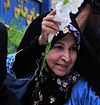 | Zahra Rahnavard
(born 1934) | No political post | No | No | — | — | — |
| Democracy Party | 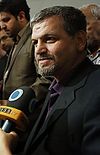 | Mostafa Kavakebian
(born 1963) | Member of the Parliament
(2004–2012) | Yes | Yes | — | No | — |
Islamic Iran Participation Front
(Jebhe Mosharekat) |  | Mohammad Reza Aref
(born 1951) | First Vice President
(2001–2005) | Yes | Yes | Yes | Yes | — |
 | Mohsen Mehralizadeh
(born 1956) | Head of National Sports Organization
(2000–2005) | Yes | No | — | — | — |
 | Masoumeh Ebtekar
(born 1960) | Head of Department of Environment
(1997–2005) | No | No | — | — | — |
Executives of Construction Party
(Sazandegi) |  | Akbar Hashemi Rafsanjani
(born 1934) | President
(1981–1997) | Yes | Yes | — | No | — |
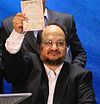 | Mohammad Shariatmadari
(born 1960) | Minister of Commerce
(1997–2005) | Yes | Yes | Yes | — | — |
 | Eshaq Jahangiri
(born 1957) | Minister of Industries
(1997–2005) | Yes | Yes | Yes | — | — |
 | Mohammad-Ali Najafi
(born 1952) | Minister of Education
(1989–1997) | No | No | — | — | — |
| National Trust Party |  | Elias Hazrati
(born 1961) | Member of the Parliament
(1988–2004) | Yes | Yes | — | No | — |
| House of Labours |  | Hossein Kamali
(born 1953) | Minister of Labour
(1989–2001) | Yes | No | — | — | — |
| — | 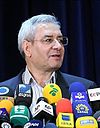 | Ebrahim Asgharzadeh
(born 1955) | Chairman of City Council of Tehran
(1999–2003) | Yes | Yes | — | No | — |
| — |  | Akbar A'lami
(born 1954) | Member of the Parliament
(2000–2008) | Yes | Yes | — | No | — |
| — |  | Ghasem Sholeh-Saadi
(born 1962) | Member of the Parliament
(1996–2008) | Yes | Yes | — | No | — |
| — | 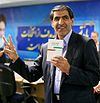 | Javad Etaat
(born 1963) | Member of the Parliament
(2000–2004) | Yes | Yes | Yes | — | — |
| — |  | Masoud Pezeshkian
(born 1954) | Minister of Health
(2001–2005) | Yes | Yes | Yes | — | — |
| Independents |  | Mohammad Gharazi
(born 1941) | Minister of Post
(1985–1997) | Yes | Yes | No | Yes | 446,015 |
 | Mohammad Saeedikia
(born 1946) | Minister of Housing
(2005–2009) | Yes | Yes | — | No | — |
 | Hassan Sobhani
(born 1953) | Member of the Parliament
(1996–2008) | Yes | Yes | — | No | — |
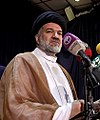 | Mohammed Bagher Kharrazi
(born 1959) | No political post | Yes | Yes | — | No | — |
 | Ahmad Kashani
(born 1947) | Member of the Parliament
(1980–1988) | Yes | Yes | — | No | — |
 | Davoud Ahmadinejad
(born 1950) | Chief of Staff of the Presidential House
(2005–2008) | Yes | Yes | Yes | — | — |
 | Tahmasb Mazaheri
(born 1953) | Governor of Central Bank
(2007–2008) | Yes | Yes | — | No | — |
 | Ramin Mehmanparast
(born 1956) | Deputy Minister of Foreign Affairs
(2010–2013) | Yes | Yes | Yes | — | — |
 | Hooshang Amirahmadi
(born 1947) | No political post | Yes | Yes | — | No | — |

























































